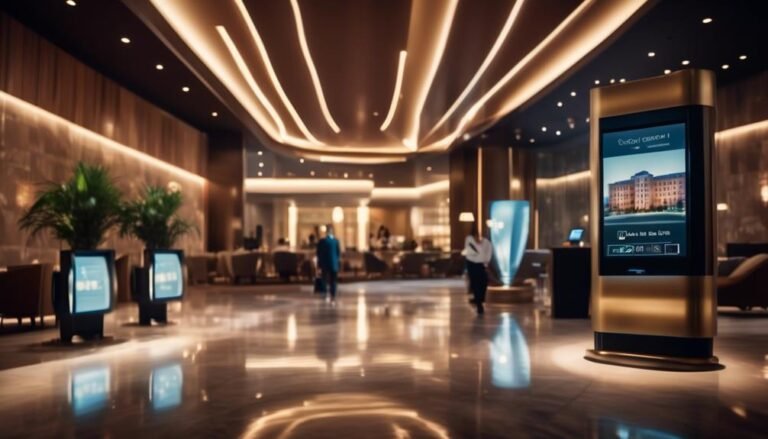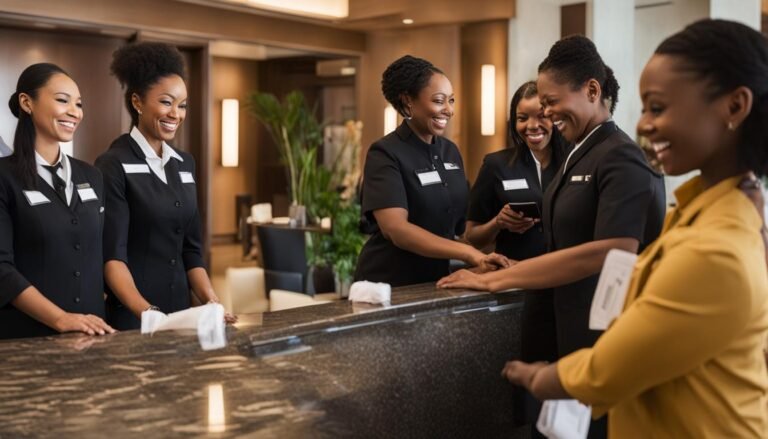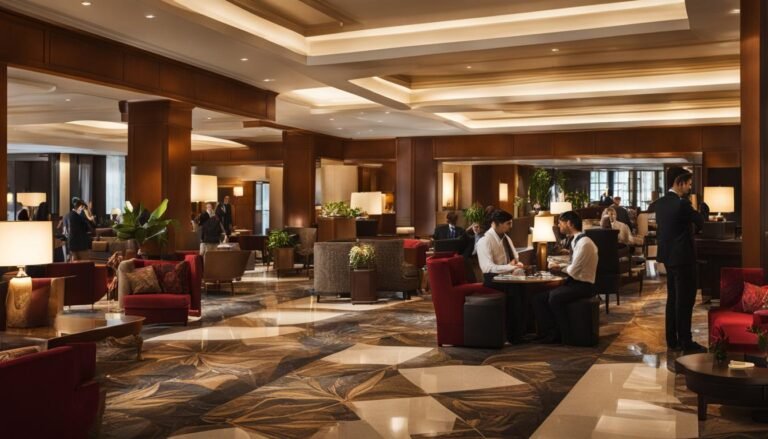Improving Team Communication in Travel and Tourism
In the fast-paced and dynamic industry of travel and tourism, effective team communication is paramount to success. It is the cornerstone upon which seamless operations, exceptional customer service, and memorable experiences are built. From the coordination of travel itineraries to ensuring the satisfaction of guests, every aspect of this industry hinges on clear and efficient communication among team members.
In this discussion, we will explore the multifaceted strategies and tools that can be employed to enhance team communication, ultimately leading to improved operational efficiency and customer satisfaction.
Key Takeaways
- Clear and efficient communication is essential for success in the travel and tourism industry.
- Implementing digital communication tools, such as virtual meetings and instant messaging, streamline processes and improve real-time collaboration.
- Tailoring communication strategies for diverse teams, including cultural sensitivity and addressing language variations, promotes effective participation and collaboration.
- Fostering a collaborative communication culture through open dialogue, active listening, and recognizing individual strengths enhances teamwork and aligns goals.
Understanding the Importance of Effective Communication
Understanding the importance of effective communication is essential for fostering positive relationships, ensuring smooth operations, and delivering exceptional customer experiences in the travel and tourism industry. Improving teamwork is heavily reliant on clear and open communication channels. When team members communicate effectively, they can share ideas, coordinate efforts, and collaborate more efficiently. This not only builds trust among team members but also enhances their ability to work together cohesively.
Furthermore, enhancing customer service is directly linked to effective communication. When staff can communicate clearly with customers, they can understand their needs, provide relevant information, and offer assistance, ultimately leading to improved customer satisfaction.
Additionally, streamlining operations within the travel and tourism industry is heavily dependent on effective communication. Clear communication between different departments and personnel is crucial for ensuring that processes run smoothly and that any issues or changes can be addressed promptly and accurately.
Implementing Digital Communication Tools
Effective communication in the travel and tourism industry can be further enhanced through the strategic implementation of digital communication tools. The use of these tools can streamline processes, improve real-time collaboration, and ensure that all team members are on the same page regardless of their physical location.
- Virtual Meetings: Digital communication tools enable virtual meetings, allowing team members to connect from different locations. This facilitates real-time updates and ensures that everyone is informed about the latest developments and changes in schedules or itineraries.
- Remote Collaboration: With the ability to collaborate remotely, teams can work together efficiently without being in the same physical space. This is especially valuable in the travel and tourism industry, where team members are often dispersed across different destinations.
- Instant Messaging: Digital communication tools offer instant messaging capabilities, which can significantly improve the speed and efficiency of communication among team members. Quick exchanges of information, updates, and queries can be made without the need for lengthy email exchanges or phone calls.
Tailoring Communication Strategies for Diverse Teams
Tailoring communication strategies for diverse teams requires a nuanced approach that acknowledges the unique cultural, linguistic, and interpersonal dynamics within the team. Cultural sensitivity plays a crucial role in effective communication within a diverse team. Understanding and respecting the cultural differences of team members can help in avoiding misunderstandings and misinterpretations that may arise due to varying cultural norms and practices.
Moreover, being mindful of individual team dynamics is equally important. Each team has its own unique blend of personalities, communication styles, and hierarchies. Recognizing and adapting to these dynamics can foster better collaboration and communication among team members.
Effective communication in diverse teams also involves recognizing the impact of language variations. It’s essential to ensure that language barriers are addressed through clear and inclusive communication. This may involve using simple and concise language, providing language support when needed, and promoting active listening to ensure that all team members can effectively participate in discussions.
Ultimately, tailoring communication strategies for diverse teams requires a deep understanding of the cultural nuances and team dynamics, allowing for the development of inclusive and effective communication practices.
Overcoming Language and Cultural Barriers
Navigating the complexities of diverse teams involves adeptly addressing language and cultural barriers to ensure seamless communication and collaboration. Overcoming language and cultural barriers in the travel and tourism industry requires a strategic approach that prioritizes effective communication and mutual understanding.
Key strategies to overcome these barriers include:
- Language training: Providing language training for team members can significantly enhance their ability to communicate with colleagues and customers from diverse linguistic backgrounds. By equipping team members with the necessary language skills, businesses can ensure that information is accurately conveyed and understood, leading to improved customer service and overall teamwork.
- Cultural sensitivity: Encouraging cultural sensitivity and awareness within the team is crucial for fostering an inclusive and respectful environment. This involves educating team members about different cultural norms, customs, and communication styles to promote mutual respect and understanding. By promoting cultural sensitivity, businesses can avoid misunderstandings and conflicts that may arise from cultural differences, ultimately strengthening team cohesion and customer relations.
Fostering a Collaborative Communication Culture
Establishing a culture of open and transparent communication is fundamental to fostering collaboration within travel and tourism teams. Building trust among team members is crucial for effective communication and teamwork. In the travel and tourism industry, where teams often consist of diverse individuals, fostering a collaborative communication culture is essential for success.
To build trust within the team, it is important to encourage open dialogue and active listening. Team members should feel comfortable expressing their thoughts and ideas without fear of judgment. This creates an environment where everyone feels valued and respected, leading to stronger bonds and enhanced teamwork.
Enhancing teamwork is another key aspect of fostering a collaborative communication culture. This involves promoting a shared vision, encouraging collective problem-solving, and recognizing the strengths of individual team members. Effective communication plays a vital role in coordinating efforts, aligning goals, and maximizing the potential of the team.
Conclusion
In conclusion, effective communication is crucial in the travel and tourism industry to ensure seamless operations and customer satisfaction.
Implementing digital communication tools, tailoring strategies for diverse teams, and fostering a collaborative communication culture are essential for success.
Overcoming language and cultural barriers is also key in promoting clear and effective communication.
By prioritizing communication, travel and tourism teams can work together more efficiently and provide a better experience for their customers.







